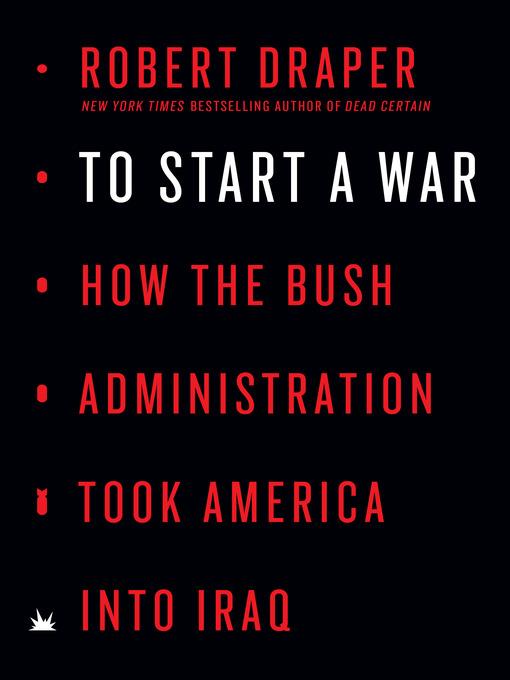
To Start a War
How the Bush Administration Took America into Iraq
کتاب های مرتبط
- اطلاعات
- نقد و بررسی
- دیدگاه کاربران
نقد و بررسی

Starred review from May 15, 2020
An authoritative account of the background to the 2003 invasion of Iraq. A writer at large for the New York Times Magazine, Draper contrasts American Middle East policy with Iraq's under Saddam Hussein since he took power in 1979; disturbingly, it remains unclear which was more dysfunctional. The author reminds readers that the U.S. supported Iraq after it invaded Iran in 1980 despite widespread atrocities perpetrated by Hussein. In 1991, American forces crushed Iraq's army after it invaded Kuwait. Convinced that this humiliation would lead to Hussein's overthrow, the U.S. withdrew. The war and ongoing sanctions impoverished Iraq, but Hussein's rhetoric convinced everyone that he remained a threat. Draper paints George W. Bush as a decent man aware of his ignorance who surrounded himself with men of vast experience: Vice President Dick Cheney, Secretary of Defense Donald Rumsfeld, and Secretary of State Colin Powell. The author, who ably distills his deep research and reporting into a fluid narrative, is not the first to focus on Paul Wolfowitz, deputy secretary of defense and a veteran adviser since the Reagan administration, who took a dislike to Hussein after the First Gulf War and never ceased urging his overthrow. Unconvinced but then horrified by 9/11, Bush vowed not to be blindsided a second time. As a result, he came to accept that Hussein, rather than Osama bin Laden, was the major figure behind terrorism. It helped that Cheney and Rumsfeld were on board. What followed makes excruciating reading because the true believers got everything wrong. Under pressure to find evidence justifying war (weapons of mass destruction, a Hussein-bin Laden connection), the CIA waffled, so the hawks created their own intelligence group that found it. An evenhanded chronicler, Draper reminds readers that most Americans, most congressmen, and even the New York Times supported invasion. Today, almost everyone has changed their minds, and the trillions of dollars wasted would be useful right now. A painful yet gripping, essential account of a disastrous series of decisions.
COPYRIGHT(2020) Kirkus Reviews, ALL RIGHTS RESERVED.

Starred review from May 18, 2020
Delusions, turf battles, and hubris drove a march of folly, according to this caustic and engrossing study of the run-up to the 2003 Iraq War. Journalist Draper (Dead Certain) documents the vaulting ambitions and outsized egos of Deputy Defense Secretary Paul Wolfowitz, long obsessed with overthrowing Iraqi dictator Saddam Hussein; Defense Secretary Donald Rumsfeld, a Machiavellian bureaucratic infighter who used the war to aggrandize his Pentagon fiefdom; Vice President Dick Cheney, who fixated on farfetched Iraqi threat scenarios; President George W. Bush, who felt a messianic duty to protect America and liberate Iraq; and CIA director George Tenet, who obligingly distorted the intelligence to validate “First Customer” Bush’s preconceptions. Drawing on hundreds of interviews, Draper details how the Administration misled itself and the public about Iraq’s weapons of mass destruction and ties to Al Qaeda, and dissects the starry-eyed assumptions and egregious lack of planning that turned the occupation into a bloody quagmire. Though the outlines of this story are familiar, Draper’s psychological insights, well-crafted narrative, and colorful details spotlight the human complexity behind this tragic episode. The history of the Iraq War has rarely been told with so much authority and precision. Agent: Sloan Harris, ICM Partners.

Starred review from June 1, 2020
The 2003 War in Iraq was an exercise in amateurish decision making, jealous infighting among President George W. Bush's department heads, and strategies based on belief more than fact, claims Draper (When the Tea Party Came to Town) in this authoritative investigation of how critical foreign policy should not be made. Draper is at his best when describing the most prominent advocates for war to rid Iraq of Saddam Hussein: Vice President Dick Cheney, Secretary of Defense Donald Rumsfeld, and Assistant Secretary of Defense Paul Wolfowitz. Rumsfeld, obsessed with controlling policy flow, is portrayed as a micromanager who frequently battled with National Security Advisor Condoleezza Rice, Secretary of State Colin Powell, and CIA Director George Tenet. Ultimately, Draper shows that this was George Bush's war because he appointed Rumsfeld, was convinced that Saddam was involved in 9/11 and hid weapons of mass destruction, and was certain that Iraqis would welcome the United States as conquering heroes. VERDICT Although exhaustive details might discourage general audiences, informed readers and foreign policy specialists will be engaged in what is likely the definitive contemporary account of the origins of the War in Iraq.--Karl Helicher, formerly with Upper Merion Twp. Lib., King of Prussia, PA
Copyright 2020 Library Journal, LLC Used with permission.

























دیدگاه کاربران